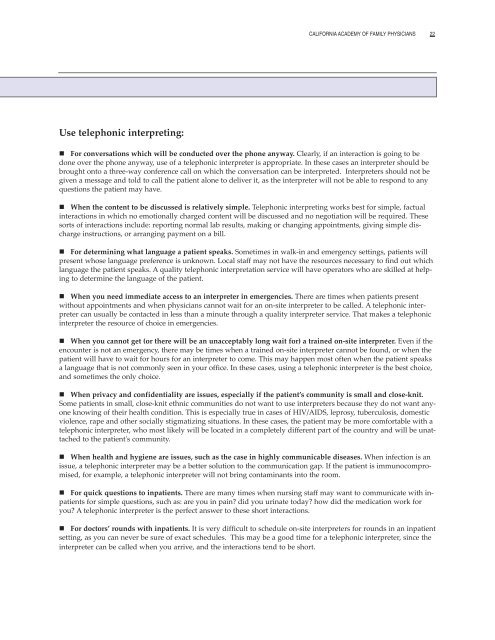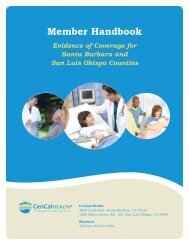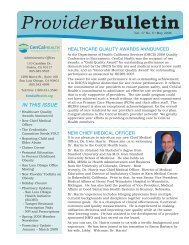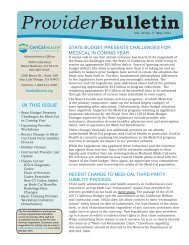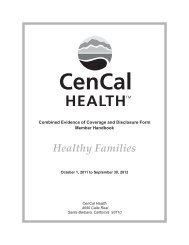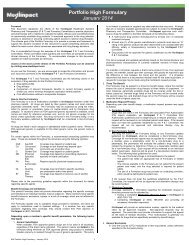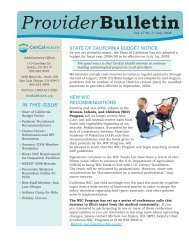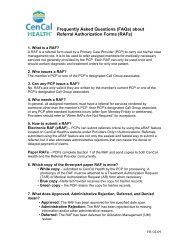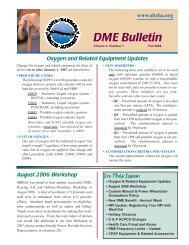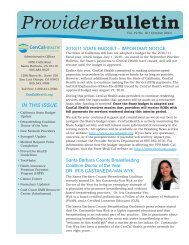Addressing Language Access Issues in Your Practice: A Toolkit for ...
Addressing Language Access Issues in Your Practice: A Toolkit for ...
Addressing Language Access Issues in Your Practice: A Toolkit for ...
You also want an ePaper? Increase the reach of your titles
YUMPU automatically turns print PDFs into web optimized ePapers that Google loves.
CALIFORNIA ACADEMY OF FAMILY PHYSICIANS 22<br />
Use telephonic <strong>in</strong>terpret<strong>in</strong>g:<br />
• For conversations which will be conducted over the phone anyway. Clearly, if an <strong>in</strong>teraction is go<strong>in</strong>g to be<br />
done over the phone anyway, use of a telephonic <strong>in</strong>terpreter is appropriate. In these cases an <strong>in</strong>terpreter should be<br />
brought onto a three-way conference call on which the conversation can be <strong>in</strong>terpreted. Interpreters should not be<br />
given a message and told to call the patient alone to deliver it, as the <strong>in</strong>terpreter will not be able to respond to any<br />
questions the patient may have.<br />
• When the content to be discussed is relatively simple. Telephonic <strong>in</strong>terpret<strong>in</strong>g works best <strong>for</strong> simple, factual<br />
<strong>in</strong>teractions <strong>in</strong> which no emotionally charged content will be discussed and no negotiation will be required. These<br />
sorts of <strong>in</strong>teractions <strong>in</strong>clude: report<strong>in</strong>g normal lab results, mak<strong>in</strong>g or chang<strong>in</strong>g appo<strong>in</strong>tments, giv<strong>in</strong>g simple discharge<br />
<strong>in</strong>structions, or arrang<strong>in</strong>g payment on a bill.<br />
• For determ<strong>in</strong><strong>in</strong>g what language a patient speaks. Sometimes <strong>in</strong> walk-<strong>in</strong> and emergency sett<strong>in</strong>gs, patients will<br />
present whose language preference is unknown. Local staff may not have the resources necessary to f<strong>in</strong>d out which<br />
language the patient speaks. A quality telephonic <strong>in</strong>terpretation service will have operators who are skilled at help<strong>in</strong>g<br />
to determ<strong>in</strong>e the language of the patient.<br />
• When you need immediate access to an <strong>in</strong>terpreter <strong>in</strong> emergencies. There are times when patients present<br />
without appo<strong>in</strong>tments and when physicians cannot wait <strong>for</strong> an on-site <strong>in</strong>terpreter to be called. A telephonic <strong>in</strong>terpreter<br />
can usually be contacted <strong>in</strong> less than a m<strong>in</strong>ute through a quality <strong>in</strong>terpreter service. That makes a telephonic<br />
<strong>in</strong>terpreter the resource of choice <strong>in</strong> emergencies.<br />
• When you cannot get (or there will be an unacceptably long wait <strong>for</strong>) a tra<strong>in</strong>ed on-site <strong>in</strong>terpreter. Even if the<br />
encounter is not an emergency, there may be times when a tra<strong>in</strong>ed on-site <strong>in</strong>terpreter cannot be found, or when the<br />
patient will have to wait <strong>for</strong> hours <strong>for</strong> an <strong>in</strong>terpreter to come. This may happen most often when the patient speaks<br />
a language that is not commonly seen <strong>in</strong> your office. In these cases, us<strong>in</strong>g a telephonic <strong>in</strong>terpreter is the best choice,<br />
and sometimes the only choice.<br />
• When privacy and confidentiality are issues, especially if the patient’s community is small and close-knit.<br />
Some patients <strong>in</strong> small, close-knit ethnic communities do not want to use <strong>in</strong>terpreters because they do not want anyone<br />
know<strong>in</strong>g of their health condition. This is especially true <strong>in</strong> cases of HIV/AIDS, leprosy, tuberculosis, domestic<br />
violence, rape and other socially stigmatiz<strong>in</strong>g situations. In these cases, the patient may be more com<strong>for</strong>table with a<br />
telephonic <strong>in</strong>terpreter, who most likely will be located <strong>in</strong> a completely different part of the country and will be unattached<br />
to the patient's community.<br />
• When health and hygiene are issues, such as the case <strong>in</strong> highly communicable diseases. When <strong>in</strong>fection is an<br />
issue, a telephonic <strong>in</strong>terpreter may be a better solution to the communication gap. If the patient is immunocompromised,<br />
<strong>for</strong> example, a telephonic <strong>in</strong>terpreter will not br<strong>in</strong>g contam<strong>in</strong>ants <strong>in</strong>to the room.<br />
• For quick questions to <strong>in</strong>patients. There are many times when nurs<strong>in</strong>g staff may want to communicate with <strong>in</strong>patients<br />
<strong>for</strong> simple questions, such as: are you <strong>in</strong> pa<strong>in</strong>? did you ur<strong>in</strong>ate today? how did the medication work <strong>for</strong><br />
you? A telephonic <strong>in</strong>terpreter is the perfect answer to these short <strong>in</strong>teractions.<br />
• For doctors’ rounds with <strong>in</strong>patients. It is very difficult to schedule on-site <strong>in</strong>terpreters <strong>for</strong> rounds <strong>in</strong> an <strong>in</strong>patient<br />
sett<strong>in</strong>g, as you can never be sure of exact schedules. This may be a good time <strong>for</strong> a telephonic <strong>in</strong>terpreter, s<strong>in</strong>ce the<br />
<strong>in</strong>terpreter can be called when you arrive, and the <strong>in</strong>teractions tend to be short.


